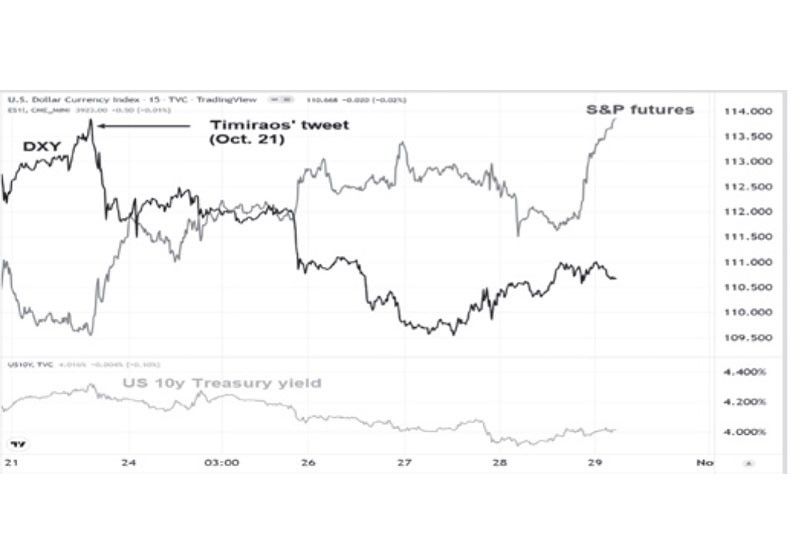The US dollar fell for the second straight week, taking a breather from the relentless rally that sent it to its highest level in 20 years, powered by the unprecedented pace of tightening by the Fed. After the nearly 30 percent rise in the past one and a half years, investors are asking if the dollar has likely seen its peak. Or is this another pause in the US dollar-wrecking ball swings before it resumes demolition?
‘Stepping down’ rate hikes
While the US dollar index (DXY) peaked last Sept. 28, its decline accelerated on Oct. 21 after Wall Street Journal’s Nick Timiraos’ put out a series of tweets saying the Fed will be “stepping down” the rate hikes after November’s 75 basis points raise. Timiraos, the so-called Fed whisperer, is the Fed’s go-to guy for communicating their thoughts. Below are his exact tweets:
“The Fed is barrelling towards a fourth straight 75-basis-point rate rise at the November FOMC meeting. That meeting could serve as a critical staging ground for future plans, including whether and how to step down to 50 basis points in December.”
“Some officials are more eager to calibrate their rate setting to reduce the risk of overtightening. But they won’t want to dramatically loosen financial conditions if and when they hike by 50 bps (instead of 75). This meeting could allow officials to get aligned on next steps.”
Significant turning point
The tweets came in the morning of Oct. 21 before the market opened. It looked like it was going to be a bad day for equities, with the S&P 500 futures down one percent going into a Friday. But after the tweets came, the US dollar index reversed, generating dramatic moves that day for FX, rates, bonds, and stocks –and marking a significant turning point.

Source: Tradingview.com, Wealth Securities Research
US dollar retreats
The DXY reached a year-high of 114.78 and has fallen 3.4 percent as of Friday’s close. Among major currencies, the British pound, Norwegian Krone, New Zealand dollar, and euro are the top performers, surging 12.2 percent, 6.6 percent, 5.4 percent, and 4.5 percent, respectively, from their year-lows. On the other hand, the Japanese yen, Singaporean dollar, and Philippine peso strengthened the most in Asia, appreciating 2.9 percent, 2.7 percent, and 2.4 percent, respectively.
Source: Bloomberg, Wealth Securities Research
Peso weakness thwarted at 59
Following the US dollar’s decline the past week, the Philippine peso strengthened to 57.97 as of Friday’s close. As discussed last week, the DOF and BSP have been vocal in stepping up their defense of the peso. The peso’s weakness was thwarted after USD/PHP encountered resistance at 59. Last week, USD/PHP broke below the upward trendline that started in June, which increased the likelihood of a retest of support at 56.45. We expect the peso to stabilize further and consolidate from here.
Source: Tradingview.com, Wealth Securities Research
Philequity Management is the fund manager of the leading mutual funds in the Philippines. Visit www.philequity.net to learn more about Philequity’s managed funds or to view previous articles. For inquiries or to send feedback, please call (02) 8250-8700 or email ask@philequity.net.

